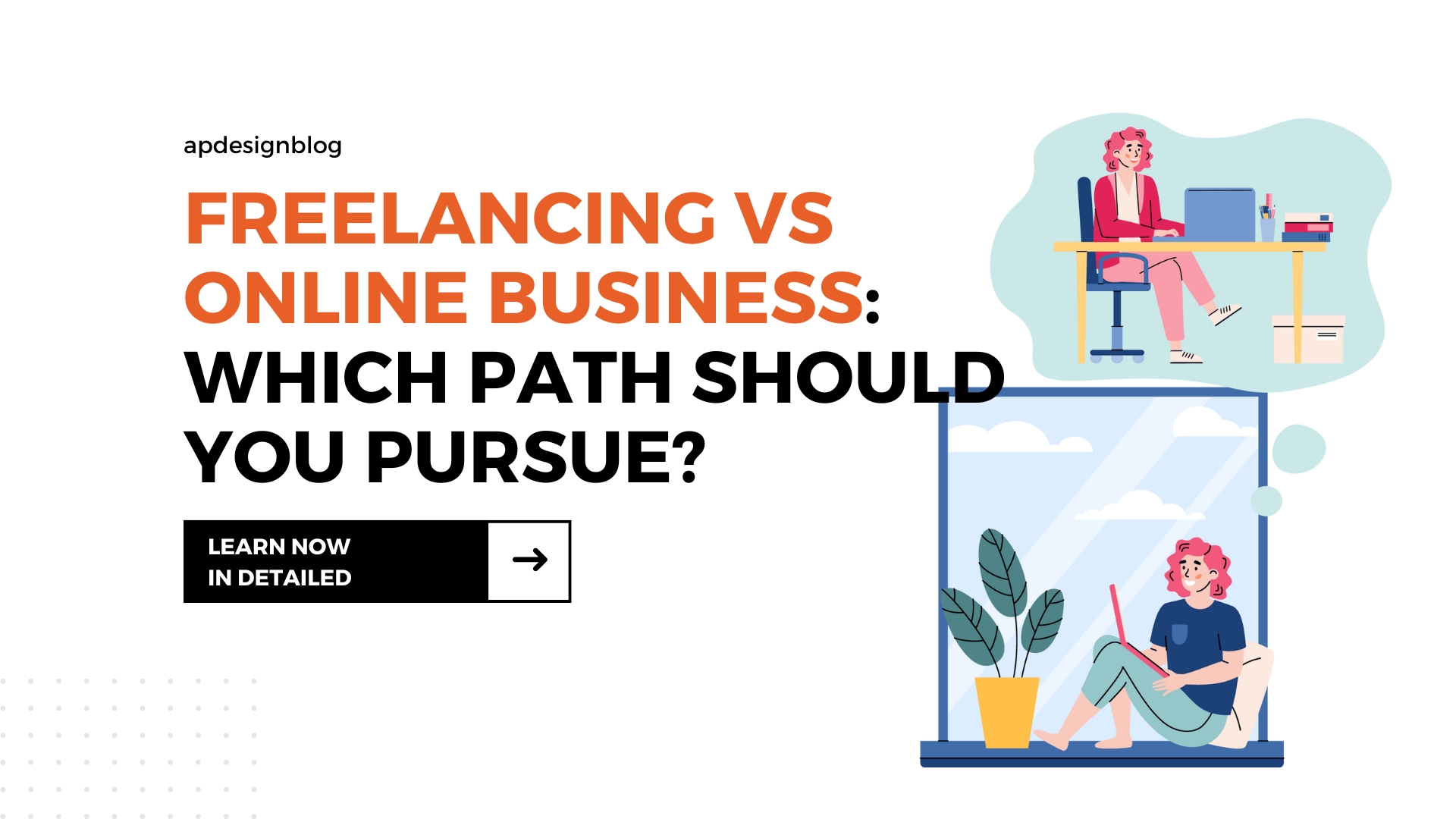The realm of Internet income presents two primary avenues: freelancing and operating an online business. Both possess the capacity to offer financial autonomy adaptability and achievement; nonetheless, they contrast fundamentally in methodology obligations and benefits. The decision between freelancing and establishing an online business is contingent upon your competencies objectives resources and risk appetite. This is an extensive resource to assist you in determining the appropriate path for yourself.

Definition of Freelancing
Freelancing entails providing specialized services to clients on a project or contractual basis. Prevalent domains of freelancing encompass writing graphic design web development virtual support and consulting.
Principal Attributes of Freelancing: Competence Oriented: You market your proficiency or services.
Client-Oriented: You serve corporations or individuals who engage you for particular assignments.
Flexible Work Arrangement: You have the autonomy to select tasks establish your schedule and work remotely.
Income Dependence: Your revenue is contingent upon the quantity of projects or hours done.
Definition of an Online Business
An online business entails the establishment and administration of a platform product or service that produces revenue. Examples encompass e-commerce platforms affiliate marketing blogging digital product sales and the development of online courses.
Essential Attributes of an Online Enterprise: Product Oriented: You create and market tangible or intangible goods.
Scalability: The capacity to increase revenue without a direct exchange of time for monetary compensation.
Self-Motivated: Achievement depends on marketing audience cultivation and product innovation.
Increased Initial Investment: Necessitates upfront work time and occasionally financial resources.
Freelancing: Advantages and Disadvantages
Advantages of Freelancing
1. Minimal Initial Investment: Only talent and customer access are required. Platforms such as Upwork Fiverr and Toptal facilitate the process of securing employment.
2. Rapid Earnings: Commence generating income within days or weeks by obtaining your initial assignment.
3. Flexibility: Select your working hours tasks and clients.
4. Skill Development: Engaging in varied projects enhances your proficiency and provides industry experience.
Disadvantages of Freelancing
1. Income Uncertainty: Freelance employment may lack consistency leading to periods of diminished customer availability or project opportunities.
2. Temporal Dependency: Earnings are contingent upon hours worked or tasks completed constraining scalability.
3. Client Management: Navigating challenging clients or stringent deadlines can induce stress.
4. Constrained Growth Potential: There exists a limit to your earnings unless you increase rates or expand your crew.
Advantages and Disadvantages of Online Business
Advantages of an Online Business
1. Scalability: In contrast to freelancing an online firm possesses the capacity for exponential expansion without a corresponding increase in burden.
2. Passive Income: Online enterprises such as the sale of digital products or the implementation of a subscription model can yield revenue without requiring active engagement.
3. Creative Autonomy: Construct a brand product or service precisely as you imagine it.
4. Ownership and Autonomy: You are in command and your achievements are not contingent upon client endorsements or external timelines.
Disadvantages of an Online Business
1. Significant Initial Effort: Establishing a website developing products and executing marketing strategies demand considerable time and effort initially.
2. Risk of Failure: Not all business concepts prosper and there exists a possibility of financial loss.
3. Initial Earnings Uncertainty: Achieving steady revenue may need months or perhaps years.
4. Continuous Oversight: Despite automation, enterprises necessitate consistent supervision upgrades and client assistance.
Comparison: Freelancing versus Online Business
| Aspect | Freelancing | Online Business |
|---|---|---|
| Startup Time | – Immediate, once you find a client. – Can start with platforms like Fiverr, Upwork, or LinkedIn. | – Requires significant setup time (building a website, creating products, etc.). – May take weeks or months to launch fully. |
| Startup Costs | – Minimal: Requires only basic tools like a computer, software, or internet. – Platform fees (if using freelancing sites). | – Varies widely: Can be as low as hosting fees for digital businesses or high for inventory-based e-commerce. |
| Income Model | – Active income: Earnings are directly tied to hours worked or projects completed. – No income during breaks or downtime. | – Passive and active income possible: Can earn even when you’re not actively working (e.g., product sales). |
| Earnings Potential | – Initially stable but capped: Limited by your rates and the number of hours you can work. – Possible to increase by raising rates or working with premium clients. | – Unlimited: Scalability allows revenue to grow without increasing your direct effort. – Long-term growth depends on demand and marketing success. |
| Flexibility | – High: You can choose clients, projects, and working hours. – Limited flexibility during active projects due to deadlines. | – High: You decide the business structure, working hours, and automation processes. – Automation tools can provide even greater flexibility. |
| Skill Requirements | – Requires a specific skill to offer services (e.g., writing, design, coding). – Continuous upskilling needed to remain competitive. | – May require multiple skills, including marketing, customer service, product development, and more. – Opportunities to outsource specialized tasks. |
| Control | – Limited control: Clients dictate the scope, deadlines, and project requirements. – Creativity often constrained by client preferences. | – Full control: You manage everything, from product development to customer engagement. – Freedom to experiment with creative ideas. |
| Scalability | – Limited: Income is tied to time or the number of clients/projects. – Scaling is possible but involves hiring a team, which adds complexity. | – High: Online businesses can grow exponentially through digital products, automation, and global reach. |
| Work-Life Balance | – Variable: Can be flexible, but tight deadlines or demanding clients can disrupt balance. – Easier to take short breaks between projects. | – Variable: May require heavy initial effort, but once established, automation can improve balance. – Scaling may introduce challenges. |
| Income Stability | – Inconsistent: Income may fluctuate based on the number of clients and projects. – Dependent on finding and retaining clients. | – Initially unstable: It may take time to generate consistent revenue. – Potential for stable, recurring income streams (subscriptions, memberships, etc.). |
| Client/Customer Focus | – Direct interaction with clients: Building relationships is essential for securing repeat work. – Clients set expectations and control payments. | – Focus on customers: Requires market research and strategies to attract and retain buyers. – Customer loyalty can drive long-term success. |
| Risks | – Low to moderate: Risk is minimal, as you only need to secure clients. – Risks include non-payment, project cancellations, or inconsistent workflow. | – Moderate to high: Business ideas may fail, or revenue streams may dry up. – Investments in inventory, advertising, or platforms can result in losses. |
| Growth Opportunities | – Gradual growth: You can grow by improving skills, increasing rates, or gaining high-paying clients. | – High potential for scaling, especially through digital products or services. – Opportunities for creating multiple income streams (e.g., courses, e-books). |
| Creative Freedom | – Limited: Creativity must align with client expectations and project guidelines. – Freelancers often execute others’ visions. | – High: Full freedom to create products, branding, and marketing strategies. – You decide your business vision and direction. |
| Automation Potential | – Low: Freelancers must actively work to earn income. – Outsourcing can help but requires managing a team. | – High: Automation tools (e.g., email marketing, chatbots) allow income generation without direct involvement. |
| Learning Curve | – Moderate: Learn a skill, find clients, and refine delivery processes. – Platforms provide a straightforward entry point. | – Steep: Requires understanding multiple aspects like marketing, branding, and operations. – Ongoing learning is essential for staying competitive. |
Who Should Opt for Freelancing?
Freelancing is optimal if: You possess a marketable ability and seek to commence earning promptly.
You favour collaborating with clients on short-term assignments.
You appreciate flexibility but prefer to avoid the obligations associated with business management.
You seek a low-risk method to generate income online.
You seek to get experience in a particular domain before pursuing alternative opportunities.
Who Should Opt for an Online Business?
An internet business is more suitable if you possess a long-term strategy for developing a scalable enterprise.
You are prepared to allocate time effort and resources in advance.
You have a passion for marketing branding and consumer interaction.
You aspire to establish passive income streams.
You are at ease with embracing chances and managing ambiguity.
Is it possible to integrate freelancing with an online business?
Certainly! A multitude of individuals commence freelancing to create revenue and acquire skills while simultaneously establishing their web enterprises. For example: A freelance graphic designer may market design templates online.
A freelance writer can get revenue from a blog through affiliate marketing.
A web developer can design and market WordPress themes while undertaking freelance projects.
Procedures for Selecting Your Course
1. Evaluate Your Competencies and Preferences: Do you excel in client interaction or in the development of products/services?
2. Establish Your Objectives: Are you pursuing immediate revenue (freelancing) or developing a scalable enterprise?
3. Assess Your Resources: Do you possess the time financial means and equipment necessary to initiate an internet business or is freelancing a more feasible option?
4. Assess the Landscape: Contemplate initiating freelancing while progressively investigating internet business concepts.
5. Engage in Continuous Learning: Freelancing and managing an internet enterprise necessitate perpetual education and skill enhancement.
Summary
Freelancing and online enterprises are both legitimate methods for generating income online each presenting distinct advantages and obstacles. Freelancing provides immediate money and flexible employment whereas an internet business presents opportunities for sustained growth and passive revenue. The appropriate decision is contingent upon your abilities objectives and risk appetite. Additionally, you may amalgamate both avenues to diversify your revenue streams and optimize opportunities.


9 thoughts on “Freelancing Vs Online Business: Which Path Should You Pursue?”